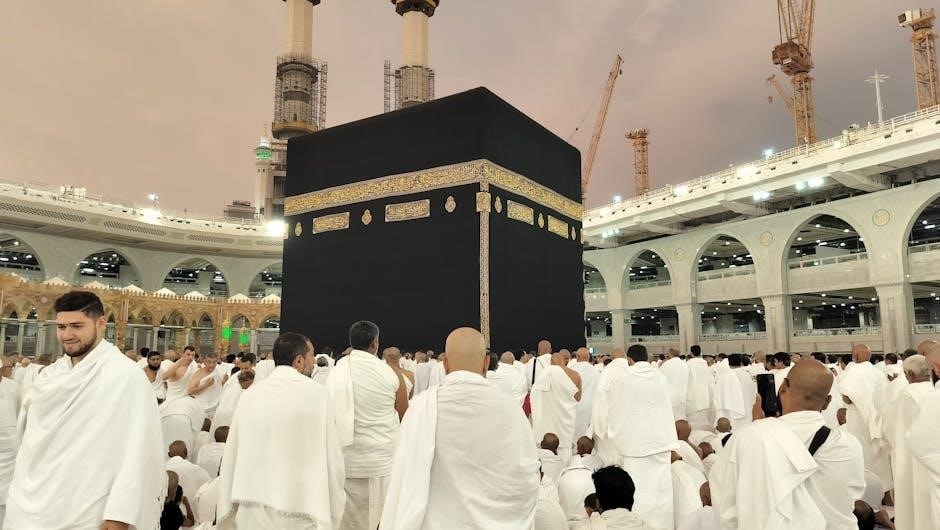Tawaf is a sacred Islamic ritual where pilgrims circumambulate the Kaaba seven times, symbolizing devotion and unity. Central to Hajj and Umrah, it embodies spiritual renewal, seeking divine blessings, and connection to faith.
Overview of Tawaf in Islamic Rituals
Tawaf is a fundamental act in Islamic worship, involving the circumambulation of the Kaaba seven times. It is a cornerstone of both Hajj and Umrah, reflecting a pilgrim’s devotion and connection to the sacred. The ritual begins with the intention (niyyah) to perform Tawaf and is accompanied by specific supplications (duas) recited during each round. These prayers emphasize seeking divine blessings, forgiveness, and guidance. Tawaf symbolizes unity among believers, as pilgrims from all over the world gather to honor the Holy Kaaba. The act is deeply rooted in Islamic tradition and is considered a means of spiritual purification and renewal. It is performed with utmost sincerity, ensuring adherence to proper etiquette and focus on the divine presence. The completion of Tawaf is marked by gratitude and reflection on the divine mercy.

Importance of Tawaf in Hajj and Umrah
Tawaf holds immense significance as a cornerstone of Hajj and Umrah, reflecting a pilgrim’s devotion and spiritual connection. It is a mandatory ritual that embodies unity, equality, and the remembrance of divine blessings. The seven rounds of Tawaf symbolize completeness and the pursuit of spiritual growth. During this act, pilgrims engage in specific supplications, seeking forgiveness, guidance, and mercy. The ritual strengthens one’s faith and humility, fostering a deeper bond with the Almighty. Tawaf is not merely a physical act but a heartfelt expression of submission to God, making it integral to the pilgrimage experience. Its importance lies in its ability to rejuvenate the soul and bring believers closer to their Creator.
The Concept of 7 Rounds in Tawaf
The seven rounds of Tawaf symbolize unity, equality, and the pursuit of spiritual renewal. Each round represents a complete cycle of devotion, embodying the belief that seven is a number of perfection in Islamic tradition. Pilgrims circumambulate the Kaaba seven times, reflecting on their faith and supplicating for divine mercy. The ritual emphasizes the importance of consistency and dedication in worship. During these rounds, specific supplications are recommended, with each round serving as an opportunity for reflection and spiritual growth. The seven rounds also symbolize the unity of all believers, as pilgrims from diverse backgrounds come together in a shared act of worship, reinforcing the universal message of Islam. This sacred practice strengthens the bond between the believer and the Almighty, fostering a sense of humility and gratitude.

The Seven Rounds of Tawaf
The seven rounds of Tawaf symbolize spiritual renewal, unity, and divine connection. Each round involves specific supplications, reflecting devotion and humility. Pilgrims seek blessings and mercy;
Round 1: Starting Tawaf and Initial Supplications
The first round of Tawaf begins with pilgrims making an intention and starting at the Black Stone, kissing or pointing towards it. They recite specific supplications, such as “Rabbana atina fid-dunya hasanatan wa fil ‘akhirati hasanatan wa qina ‘adhaban-nar” (O Lord, grant us good in this world and the next and protect us from the torment of the fire). This round sets the tone for the spiritual journey, focusing on humility and devotion to Allah. The intention is to seek His mercy and blessings, ensuring the heart is pure and focused throughout the ritual. This initial step is crucial for a meaningful Tawaf experience.
Round 2: Specific Duas and Intentions
In the second round of Tawaf, pilgrims continue to circumambulate the Kaaba with heightened focus on specific supplications; A common dua recited is “Rabbana atina fid-dunya hasanatan wa fil ‘akhirati hasanatan wa qina ‘adhaban-nar” (O Lord, grant us good in this world and the next and protect us from the torment of the fire). This round emphasizes seeking divine mercy and guidance. Pilgrims often reflect on their intentions, expressing gratitude and humbly asking for forgiveness. At the Yamani corner, many touch the wall and recite additional prayers, while others continue to kiss or gesture toward the Black Stone. This round strengthens the connection to Allah, reinforcing the purpose of Tawaf as a means of seeking His blessings and renewal of faith.
Round 3: Reciting Quranic Verses and Prayers
During the third round of Tawaf, pilgrims often focus on reciting specific Quranic verses and prayers, deepening their spiritual connection. A recommended supplication is “Rabbana atina fid-dunya hasanatan wa fil ‘akhirati hasanatan wa qina ‘adhaban-nar” (O Lord, grant us good in this world and the next and protect us from the fire). Many also recite the Quran, particularly verses like Surah Al-Ikhlas or Al-Furqan, seeking divine mercy. At the Yamani corner, touching the wall and reciting prayers is a common practice. This round emphasizes the importance of combining physical movement with heartfelt recitation, fostering a deeper sense of humility and devotion. Pilgrims are encouraged to maintain focus and sincerity, ensuring their supplications are meaningful and heartfelt.

Round 4: Seeking Blessings and Forgiveness
In the fourth round of Tawaf, pilgrims focus on seeking divine blessings and forgiveness. A recommended supplication is “Rabbana atina fid-dunya hasanatan wa fil ‘akhirati hasanatan wa qina ‘adhaban-nar” (O Lord, grant us good in this world and the next and protect us from the fire). This round is also an opportunity to reflect on past actions and seek mercy. Pilgrims often recite specific prayers, such as “Allahumma ighfir lana dhunubana” (O Allah, forgive our sins), while continuing their circumambulation. At the Yamani corner, many recite “Rabbana atina min ladunka rahmatan wa hayyi lina min amrina” (O Lord, bestow upon us mercy and grant us guidance). This round emphasizes spiritual cleansing and the pursuit of divine pardon, fostering a sense of humility and repentance.
Round 5: Reflecting on Spiritual Growth
During the fifth round of Tawaf, pilgrims reflect on their spiritual growth and seek divine guidance. A recommended supplication is “Allahumma inni as-aluka al-huda wa al-‘afafa wa al-‘isma” (O Allah, I ask You for guidance, piety, and protection from sins). This round emphasizes self-reflection and the pursuit of righteousness. Pilgrims often pray for the strength to adhere to Islamic teachings and to cultivate a deeper connection with Allah. At the Yamani corner, reciting “Rabbana atina min ladunka rahmatan wa hayyi lina min amrina” (O Lord, bestow upon us mercy and grant us guidance) is common. This round is a moment for introspection, seeking divine assistance in maintaining a righteous path and nurturing one’s faith. It highlights the journey toward spiritual maturity and divine closeness.
Round 6: Prayers for Protection and Guidance
During the sixth round of Tawaf, pilgrims focus on seeking Allah’s protection and guidance in their lives. A recommended supplication is “Allahumma inni as-aluka al-‘afwa wa al-‘aman” (O Allah, I ask You for forgiveness and safety). This round emphasizes trust in Allah’s mercy and the desire for spiritual and worldly protection. Pilgrims often pray for strength against temptations and guidance on the righteous path. At the Yamani corner, reciting “Rabbana atina fid-dunya hasanatan wa fil-‘akhirati hasanatan wa qina ‘adhaban-nar” (O Lord, grant us good in this world and in the Hereafter and protect us from the torment of the Fire) is common. This round is a heartfelt plea for divine safeguarding and eternal guidance.
Round 7: Completing the Tawaf with Gratitude
The seventh round of Tawaf marks the culmination of this sacred ritual, filled with gratitude and reflection. Pilgrims often recite the Quran or engage in heartfelt supplications, expressing thanks for the opportunity to complete Tawaf. At the Yamani corner, reciting “Rabbana atina fid-dunya hasanatan wa fil-‘akhirati hasanatan wa qina ‘adhaban-nar” (O Lord, grant us good in this world and in the Hereafter and protect us from the torment of the Fire) is recommended. Upon completing the seventh round, pilgrims perform the final Istilam of Hajr-e-Aswad, kissing or touching the Black Stone, and recite “Bismillahi Allahu Akbar” (In the name of Allah, Allah is the Greatest). This round signifies spiritual fulfillment and gratitude for divine blessings.
Completing the Tawaf
Upon finishing seven rounds, pilgrims perform the final Istilam of Hajr-e-Aswad, reciting specific duas like Bismillahi Allahu Akbar, marking the ritual’s completion with gratitude.
Final Duas After Completing 7 Rounds
After completing the seven rounds of Tawaf, pilgrims recite specific duas to express gratitude and seek divine mercy. One such supplication is Rabbana atina fid-dunya, asking for blessings in this life and the hereafter. Another is O Allah, grant us protection from the Fire, emphasizing spiritual safeguarding. These prayers are recited with sincerity, reflecting on the journey and seeking forgiveness. The final dua is a heartfelt expression of thanks for completing the ritual successfully. This moment is profound, as it encapsulates the pilgrim’s connection to the divine and the fulfillment of their sacred duty. The duas serve as a culmination of the Tawaf experience, reinforcing faith and humility.
Performing Istilam of Hajr-e-Aswad
After completing the seven rounds of Tawaf, pilgrims perform Istilam by kissing or touching the Hajr-e-Aswad, a sacred stone set in the eastern corner of the Kaaba. This act symbolizes renewal of covenant with Allah and marks the completion of Tawaf. The recommended dua during Istilam is Bismillahi Allahu Akbar Wa Lillah Hil Hamd, expressing praise and glorification of Allah. Pilgrims should approach the stone calmly, ensuring respect and order. If kissing is not possible due to crowds, simply pointing or touching suffices. This ritual is deeply symbolic, representing humility, devotion, and acceptance of divine will. It concludes the Tawaf with a profound sense of spiritual fulfillment and connection to Islamic traditions.

Additional Considerations
Additional considerations during Tawaf include proper attire, maintaining cleanliness, and respectful conduct. Pilgrims must ensure Ihram is worn correctly, recite prescribed duas, and avoid distractions.
Etiquette and Proper Conduct During Tawaf
Proper etiquette during Tawaf includes facing the Kaaba, wearing Ihram correctly, and maintaining cleanliness. Pilgrims should avoid distractions, ensure modesty, and respect others. Kissing the Black Stone respectfully and reciting prescribed duas is essential. One must walk, not run, and avoid pushing or causing inconvenience. Keeping the intention pure and focusing on worship is vital. Reciting the Quran or Prophet’s prayers enhances the spiritual experience. Avoid unnecessary conversations and ensure Ihram remains in the correct position throughout the seven rounds. Respectful behavior and adherence to Islamic norms are integral to the sanctity of Tawaf.
The Role of Ihram in Tawaf
Ihram holds a pivotal role during Tawaf, symbolizing equality and devotion. Pilgrims don Ihram, a seamless garment, to shed worldly status and focus on spirituality. It must be worn correctly: under the right armpit and over the left shoulder. Ihram signifies a state of consecration, preparing pilgrims for sacred rituals like Tawaf and Saee. Adhering to Ihram’s rules ensures purity and compliance with Islamic traditions. Its simplicity reminds pilgrims of humility and unity, fostering a deeper connection with divine worship. Throughout the seven rounds of Tawaf, maintaining Ihram’s proper state is essential for the ritual’s validity and spiritual efficacy.
Tawaf embodies spiritual rejuvenation, reinforcing faith and divine connection. Completing seven rounds with gratitude and prescribed duas ensures blessings, fostering a deeper, enduring impact on one’s faith journey.
Key Takeaways and Benefits of Tawaf
Tawaf is a pillar of Hajj and Umrah, offering profound spiritual and emotional benefits. It fosters unity among believers and strengthens one’s connection to faith. By performing Tawaf, pilgrims seek divine blessings, forgiveness, and guidance, while reflecting on their spiritual journey. The ritual emphasizes gratitude, humility, and devotion, with each round carrying specific supplications to maximize its impact. Completing the seven rounds with sincerity ensures a deeper sense of fulfillment and renewal. Tawaf also symbolizes equality and unity, as all pilgrims, regardless of background, circumambulate the Kaaba together. The prescribed duas and supplications during Tawaf further enhance its significance, making it a transformative experience for those who perform it with the right intentions and heartfelt dedication.
Final Thoughts on the Significance of Tawaf
Tawaf is a profound act of worship that embodies the essence of devotion, unity, and spiritual rejuvenation. It serves as a powerful reminder of humanity’s shared purpose and connection to the divine. By engaging in Tawaf, pilgrims not only fulfill a sacred duty but also experience a deep sense of inner peace and renewal. The prescribed supplications and rituals enhance the spiritual impact, making Tawaf a transformative experience. It is a testament to faith, humility, and the eternal bond between the believer and the Almighty. Through Tawaf, one seeks not only divine blessings but also a stronger commitment to a righteous and meaningful life.